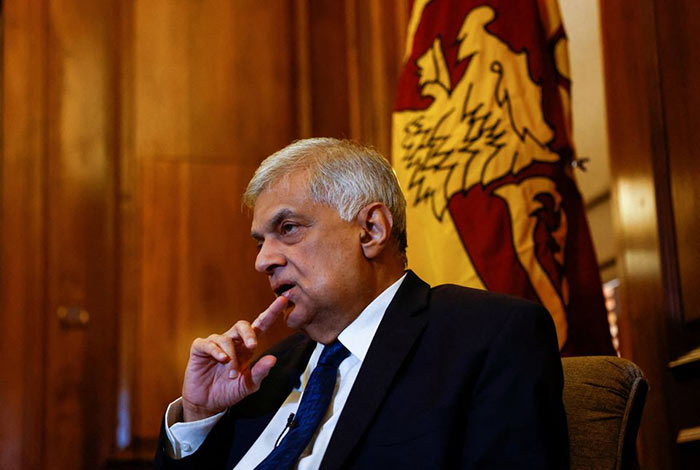Sri Lanka to keep ‘middle-income’ status but seek concessional loans

Sri Lanka’s President Ranil Wickremesinghe. (REUTERS / Dinuka Liyanawatte)
Sri Lanka will remain a middle-income country but request the World Bank to grant it some loans generally offered to poorer nations, the president’s office said on Tuesday, clarifying a cabinet spokesperson’s earlier comments on the matter.
The island nation of 22 million is facing its worst economic crisis in more than seven decades and the spokesperson said earlier in the day that the government would seek to change its economic status to “low income country” for easier funding.
President Ranil Wickremesinghe’s office, however, said the status change would not happen.
“Sri Lanka will remain a middle-income country,” the office said in a statement. “We will request the World Bank to grant the country eligibility to obtain loans offered by the International Development Association (IDA).”
The IDA is an arm of the World Bank that helps the world’s poorest countries with the aim of reducing poverty by providing zero to low-interest loans and grants.
The local World Bank office in Colombo had no immediate comment on the Sri Lankan request. It said it would continue its discussions with Sri Lanka and that the “key priority” was to move ahead with debt restructuring and economic reforms to put the country’s growth back on track.
The government valued Sri Lanka’s economy at $89 billion last year. Even with an 8.7% contraction in gross domestic product predicted for this year and accounting for currency depreciation, the economy will be around $75 billion, with a per-capita income of about $3,400.
The World Bank defines low-income countries as those with a per-capita income of $1,085 or less in 2021.
Sri Lanka reached a preliminary agreement with the International Monetary Fund (IMF) for a $2.9 billion bailout in September but has to put its debt on a sustainable path before the funds can be disbursed.
The COVID-19 pandemic battered the tourism-reliant economy and slashed remittances from workers overseas, while rising oil prices, populist tax cuts and a seven-month ban on the import of chemical fertilisers last year that devastated agriculture have been the other factors for the crisis.
It has struggled with an acute dollar shortage to pay for imports of food, fuel and medicine, a plunge in the rupee and runaway inflation.
(Reuters)
Latest Headlines in Sri Lanka
- Sri Lanka President issues extraordinary gazette on vehicle imports January 27, 2025
- Sri Lanka targets $36 Billion in export revenue by 2030 under new national policy January 27, 2025
- Air Vice Marshal Vasu Bandu Edirisinghe appointed new SLAF commander January 27, 2025
- Ex-Minister Piyankara Jayaratne faces three corruption cases filed by CIABOC January 27, 2025
- 2,300 centers to be set up for Sri Lanka’s e-NIC information collection January 27, 2025


